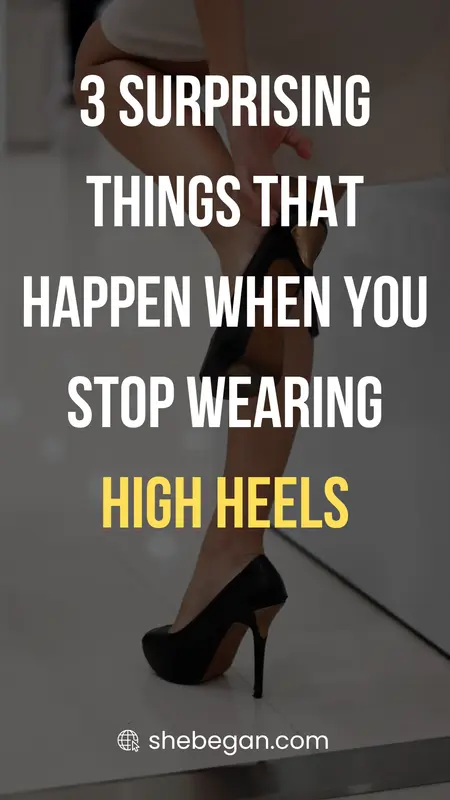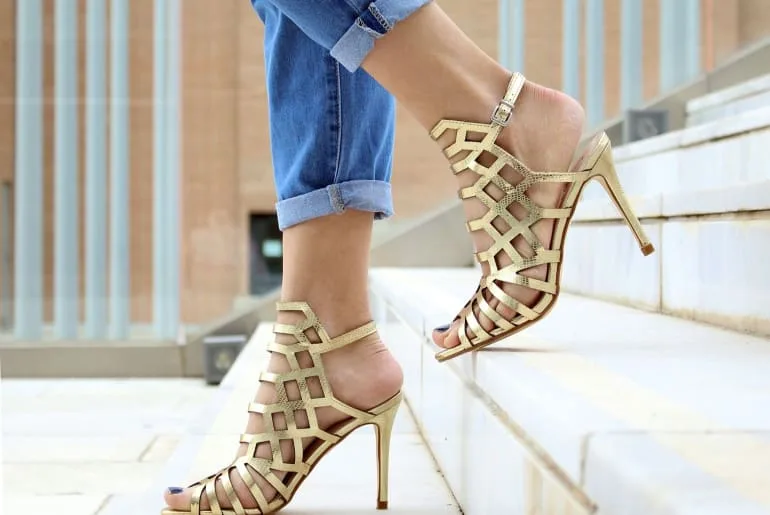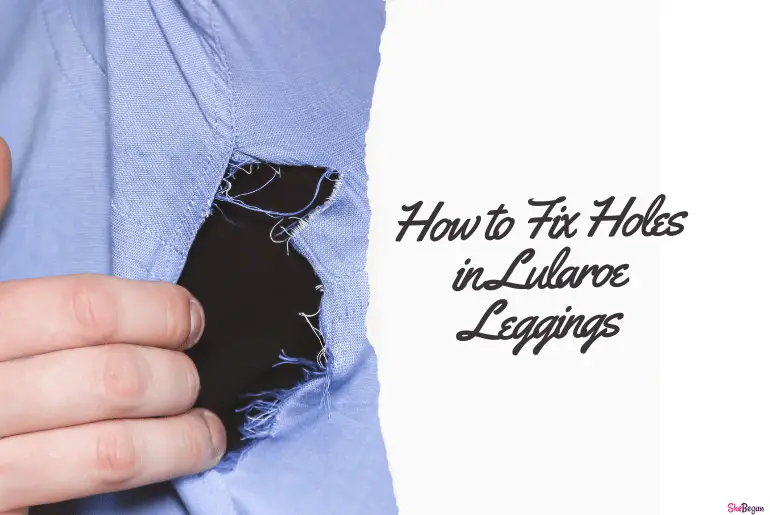High heels can be an attractive way to dress up your outfit, but what many people don’t realize is that they can also cause long-term damage to your feet. The problem with wearing high heels is strain the foot and ankle overtime.
This can result in broken bones or even serious infections if you continue wearing them for extended periods of time. So if you have been wondering how old you should stop wearing high heels, now is probably a good time to consider it.
So, at what age should a woman stop wearing high heels? I will say around 50-60 years old. I think it’s fair to say that most people have stopped wearing heels by this age. If you’re still wearing them, I would suggest transitioning out of them gradually until you can go without them altogether.

1. Physical changes with age
As individuals age, various physiological changes occur in the body, particularly in the musculoskeletal system. Connective tissues lose elasticity, muscles weaken, and bones may become more brittle. These changes can impact one’s ability to maintain balance and stability while wearing high heels.
2. Increased susceptibility to foot and joint issues
With advancing age, the likelihood of developing foot-related problems such as bunions, hammertoes, and plantar fasciitis increases. High heels exacerbate these issues by placing excessive pressure on the toes, heels, and arches, potentially leading to chronic pain and deformities. Moreover, aging joints may experience decreased flexibility and range of motion, making it more challenging to tolerate the strain imposed by high-heeled footwear.
3. Lifestyle considerations
Age often corresponds with changes in lifestyle, including shifts in occupational demands, physical activity levels, and social engagements. Certain professions or activities may necessitate prolonged periods of standing or walking, making the choice of footwear crucial for minimizing discomfort and preventing injury.
Why You Should Minimize Wearing Heels
The following are the reasons you should consider ditching high heels:
1. Sore feet go hand in hand with high heels
But do you know the other pains high heels can cause? While heel pain is a common complaint, it’s not just your feet that suffer from wearing them. High heels can cause hip and knee pain as well, which leads to back and ankle problems.
The constant pressure on the ball of your foot when wearing high heels will put stress on all of these areas and repeated stress like this can lead to chronic pain in any or all of them. If you have a history of back or hip injuries, then you are especially at risk for developing chronic issues if you keep wearing high heels regularly.
2. High heels may be bad for your posture
Wearing high heels can throw off your posture and make it difficult for you to walk normally when not wearing them which may lead to back problems as well as knee issues if they’re worn too often or an excessive amount of time each day (such as at work).
3. They can affect your joints and muscles
Wearing heels can affect your joints and muscles. It puts pressure on your joints and muscles, which can cause pain and inflammation. This can lead to arthritis, muscle strain, muscle fatigue, muscle spasms, and cramps. High heels can also cause joint contractions that aren’t good for your body.
One study found that wearing high heels increases the risk of foot damage by 30%. The study also found that women with high heel shoes were 10 times more likely to get bunions than women who wear flats all the time.
4. Heels can cause bunions and hammertoes
In addition to the pain caused by walking in high heels, they can also cause bunions and hammertoes. Both of these conditions are caused by the shoe rubbing against your toes. You may have heard of bunions before, but you might not be familiar with what a hammertoe is or how it’s different from a bunion. A bunion is when part of the big toe sticks out further than normal it looks like it’s been bent over.
A hammertoe happens when one or more toes bend inward painfully, usually at the second joint (the middle). These conditions can lead to disfigurement if left untreated and can make wearing certain types of shoes difficult because of their appearance.
5. They may damage the balls of your feet
If you’ve been wearing high heels for long enough, there’s a good chance that you’ve experienced some discomfort in the balls of your feet. This can be caused by inflammation and swelling, which can lead to pain and limping. In extreme cases, it could cause you to lose balance and fall down or worse. You may also injure other parts of your body as well.
Can I Wear Heels at 50?
Yes, but it’s important to remember that the older we get, the more our bodies change. Age-related changes in your feet, knees, hips, and back can affect your ability to wear high heels safely. If you’ve been wearing heels for years and want to continue doing so as you get older, it’s best to practice moderation by limiting how often and long you wear them.
Also, keep in mind that over time your joints will become stiffer and less flexible which makes standing on tiptoes difficult or impossible. You may also experience back pain from wearing heels regularly if they don’t fit properly or don’t have good support.
Can a 70-Year-Old Woman Wear High Heels?
Yes, a 70-year-old woman can wear high heels. No age is too old for heels. However, growing old makes it difficult for the joint and muscles around the leg to hold the strain that comes with wearing high heels. As a 70-year-old woman, I’ll recommend that you consider wearing high heels less frequently for the health of your legs.
What Happens When You Stop Wearing High Heels?
1. You will be happier
You will no longer be reliant on high heels to make you feel good about yourself or give you that extra boost of confidence. You’ll be free to walk, run and dance in comfort and ease instead of feeling pain and discomfort.
2. You will be healthier
The weight distribution while wearing heels puts more strain on one side of your body than the other, which can cause back pain, knee problems, and even hip dysplasia. If you have ever had any of these ailments before then it is likely that they will improve once you stop wearing them.
3. You will be more comfortable
This is because there is less pressure being put on your feet when walking around barefoot or with flats (flats are always preferable). Your legs will also feel better without having to support an unnatural weight all day long perfect for summer when sandals are all we want.
Conclusion
We know that you love your high heels, but it’s time for them to go. We hope this article has given you some insight into the damage that these shoes can do to your feet and body as you get older. While wearing them is fun and exciting, it’s important to remember that there are many other options out there when it comes time for a new pair of shoes.







2 Comments
is there any particular age that people can’t wear high heels
It is advisable to stop wearing high heels when you are 50 upwards because of the strain on your legs, feet, knees, etc. However, it also depends on the individual. Some people can conveniently wear high heels in their 60s while some ladies can’t do that in their 40s. In the end, it is what works for you personally that matters.